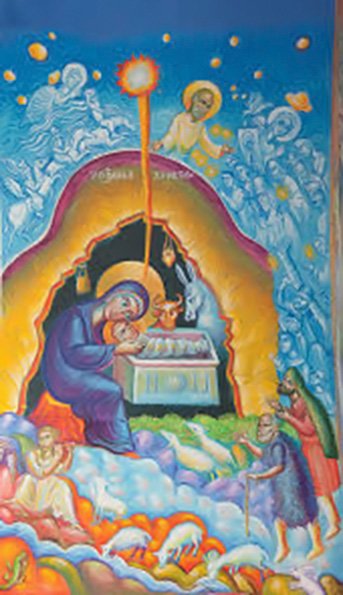Theology. Why Jesus had to be born by a Virgin, according to Maximus the Confessor, part 1

(This is the icon of fr. Stamatis Skliris. I am a very big fan of his works. Sadly, I couldn't find a picture of better quality, but I hope that this one also depicts his outstanding work and style)
This question has puzzled me for long time, because sin is conceived as a personal, nor natural cathegory. Every person is responsible for their actions, and nobody can inherit sin. Why, then, existed the need for Christ to be born by a Virgin. It doesn't have anything to do with sin. Moreover, if He is to be completely identificated with us, shouldn't have been better that He was born the same way as we do? But, recently, while reading Centuries on Theology by Maximus the Confessor, I think i came to a conclusion that may solve this puzzling question.
Maximus here refers to the nexus of dualism of pleasure and pain. According to his teaching about natural energy and will in man, he states that the transcendence of pleasure and pain is a prerequisite for man to clean his heart from the passions. The whole of modern life is governed by pleasure and pain (ethics is based on it: good is what causes me pleasure, bad is what causes me pain). In reality, man tries to escape reality through the satisfaction of sensual plesure. I think that the problems of excesive use of drugs, alcohol and many more, have their root in the above explained problematique.
The origin of pleasure and pain
In the creation of world by God the Trinity, man was created as the apex of creation, microcosm in macrocosm. Analyzing the creation of man and birth of pleasure and pain, Maximus says that God made the human nature without pleasure and pain: "He did not make the senses susceptible to either pleasure or pain". While there was no pleasure and pain before the Fall, there existed a noetic faculty , through which man could enjoy God. The problem is that man misused that natural faculty. Man oriented "the natural longing of the nous to God" to sensible things and thus "by the initial movement towards sensible things, the first man transferred his longing to his senses, and trough them began to experience this pleasure in a way contrary to nature". Words "according to nature" and "contrary to nature" show the radical ontological shift in man after the Fall.
After the unnatural movement of the God-established natural will of man, God, being interested in man's salvation "implanted pain as a kind of chastising force". Pain, which God, in His love for man, tied to sensual pleasure, represents the "law of death", whic has, ever since then, been very closely related to human nature. In this way, "the manic longing of the nous", can be restrained and set back on the right track. Therefore, pleasure and pain constitute the so-called original sin.
Here Maximus makes an amazing observation: the trasgression devised pleasure "in order to corrupt the will", i.e. freedom of man, and also imposed pain (death) "to cause the dissolution of man's nature". So, the pleasure causes sin, which is a voluntary death of the soul, while pain, through the separation of soul from the body, causes the disintegration of flesh. So, God allowed death to actualize in human nature because of philanthrophy, for pain is refutation of pleasure. As Maximus says: "God has providentially given man pain he has not chosen, together with death that follows from it, in order to chasten him for the pleasure he has chosen".
Therefore, pleasure precedes pain and this was caused by man in the beggining. For man after the Fall, pleasure and pain are intermingled, and the experience of pain leads usto the enjoyment of pleasure. In this tragic state, man cannot, altough having pain that restrains human will to go after the wrong pleasure, reverse and eliminate the law of death that is now actualized in his nature. Now, man can, through asceticism, cure and teach the will to go after God, but it cannot destroy death, which is an active part of his very being. On this line of thinking we can find the answe to question: Why did God become man - Cur Deus Homo?

What he says is nonsense. It's certainly not in the Bible or an attempt to interpret the Bible.
At the very least, Jesus was born of a virgin as a way to show that he was different from every other person who ever lived. Also because the Bible predicted it 800 years before it happened.
(Isaiah 7:14 NIV) Therefore the Lord himself will give you a sign: The virgin will be with child and will give birth to a son, and will call him Immanuel.
Yes, I agree that He was born from a Virgin as a sign to show something different. But why is that? Why did Isaiah foretold that such a thing would happen? What Maximus says is not in the Bible by words, but is in the Bible by it's spirit (Spirit). It seems to me that it is unappropriate to say that Jesus had to be born by a Virgin, because Isaiah said so. He did say it in Spirit, nonetheless, but why it was God's plan for Christ to be born like that? Maximus is asking this question, and i think that he gives a satisfying answer to it.
So, Maximus tries to give us a deeper understanding of the reason behind it, and, as a great systematician he is, he does give us an answer that is systematic, holystic in its relation to whole of Christian theology.